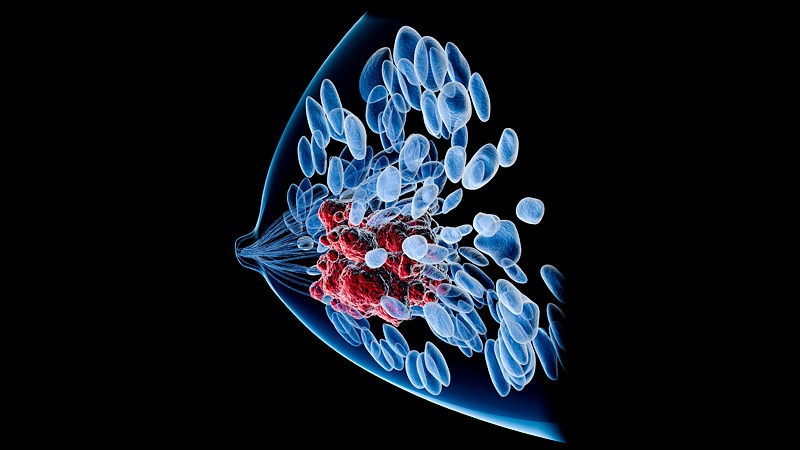
Among Black patients, breast cancer is often more aggressive, and mortality rates are 40% higher than among White women.
There has been speculation that there are biological differences in the disease. A new study has found a distinct molecular signature, characterized by "exhausted" nonfunctional T cells, in tumor samples from Black patients.
The study was published online January 5 in the Journal of the National Cancer Institute.
"What is exciting about these findings is that these exhausted immune cells may be able to be re-energized by treatment with immunotherapy," said senior author Christine Ambrosone, PhD, chair of cancer prevention and control and senior vice president of population sciences at Roswell Park Cancer Center, Buffalo, New York.
"In the past, breast tumors, for the most part, have not been found to be responsive to immunotherapy, but these cells more common in tumors from Black women are likely to be able to be reactivated by immunotherapy, which offers new hope for treatment," she said.
Song Yao, PhD, a professor of oncology and first author of the article, noted that this study provides evidence that there are racial differences in how the immune system responds to and interacts with tumor cells.
"Although more immune cells were present in tumor tissues in Black women, they tended to become exhausted and dysfunctional to control the tumor cells," he said. "Because checkpoint inhibitor immunotherapy can reinvigorate the exhausted immune cells, our findings suggest that this new type of cancer treatment may present a new opportunity to narrow the racial gaps in breast cancer mortality rates."
Yao emphasized that these findings cannot yet guide treatment because the study did not directly test checkpoint inhibitor immunotherapy in Black vs White cancer patients.
"Further studies will be needed," he said. "It will also be important to study whether there are differences in toxicities between Black and White cancer patients who are treated with immunotherapy."
Nevertheless, these findings do suggest that immunotherapy could be a treatment option for these women, Ambrosone emphasized. "Up until now, only triple-negative breast cancer has been commonly treated with immunotherapy," she said. "Our findings that tumors from Black women have higher levels of exhausted immune cells indicate that, regardless of breast cancer subtype, immunotherapy may be effective in treating this population."
As a next step, the investigators are conducting a nationwide study in which they will enroll a large number of cancer patients who are about to be treated with immunotherapy. "Our goal is to compare responses between Black and White patients and to see if, indeed, Black patients have better responses, as we are hypothesizing," Ambrosone said. "We will also be looking at what other factors may influence these treatment outcomes.
"We are hopeful that this study will give us information to understand how best to treat cancer patients from all groups in the US and to reduce or eliminate cancer health disparities," she added.
Explanation for Worse Outcomes?
For this study, Ambrosone and colleagues analyzed tumor samples from 1315 patients with invasive cancer (920 Black patients and 395 White patients) in the Women's Circle of Health Study.
They used pathologic studies and gene expression profiling to characterize infiltrating immune cells in breast tumor microenvironment.
Racial differences in tumor immune phenotypes were then compared, and results were validated in a publicly accessible dataset.
The team found that although more immune cells were present in tumors from Black patients, the immune cells seemed to be less active against tumor. A distinct signature indicating a higher ratio of exhausted CD8+ T cells to total CD8+ T cells (ExCD8-r) was consistently associated with worse survival. That finding was more pronounced among hormone receptor (HR)–positive patients.
Among HR-negative patients, the combination of the absolute fraction of CD8+ T cells and ExCD8-r signature identified the CD8 lowExCD8-rhigh subgroup. This was the subgroup among Black patients that had the worst survival.
Points to Ponder
This research regarding how the immune system interacts with the biology of tumor may explain the worse prognosis for Black women with breast cancer, commented Charles L. Shapiro, MD, professor of medicine at the Icahn School of Medicine at Mount Sinai and director of translational breast cancer research, Tisch Cancer Institute at Mount Sinai, New York City.
"A CD8 T-cell exhaustion is more prevalent in Blacks, having implications for immunotherapy," he said. "This is one of the largest studies to highlight differences based on race, but like all well-conceived and well-done studies, it leads to more questions.
"The finding that only the signature of CD8 T-cell exhaustion was prognostic in estrogen receptor–positive breast cancers was unexpected, as it is estrogen-negative breast cancer that responds better to immunotherapy," he said. "This may have implications for estrogen receptor–positive breast cancers, which are considered 'cold tumors' because of their lesser responses to immunotherapy."
The study was supported by the Breast Cancer Research Foundation and by grants from the National Cancer Institute. The authors have disclosed no relevant financial relationships.
J Natl Cancer Inst. Published online January 5, 2021. Abstract
For more from Medscape Oncology, join us on Twitter and Facebook.
"breast" - Google News
January 12, 2021 at 01:46AM
https://ift.tt/3btu4jW
Distinct Signature in Breast Tumors From Black Patients - Medscape
"breast" - Google News
https://ift.tt/2ImtPYC
https://ift.tt/2Wle22m
Bagikan Berita Ini














0 Response to "Distinct Signature in Breast Tumors From Black Patients - Medscape"
Post a Comment